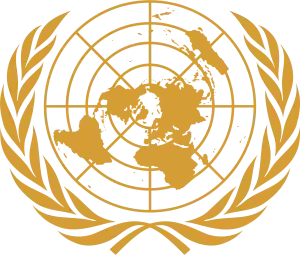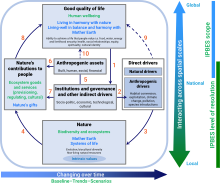Intergovernmental Science-Policy Platform on Biodiversity and Ecosystem Services
The Intergovernmental Science-Policy Platform on Biodiversity and Ecosystem Services (IPBES) is an intergovernmental organization established to improve the interface between science and policy on issues of biodiversity and ecosystem services.[1] It is intended to serve a similar role to the Intergovernmental Panel on Climate Change.[2]
 | |
| Abbreviation | IPBES |
|---|---|
| Formation | 2012 |
| Type | Platform |
| Legal status | Active |
| Headquarters | Bonn, Germany |
Head | Chair of the Intergovernmental Science-Policy Platform on Biodiversity and Ecosystem Services |
| Website | www.ipbes.net |
Establishment and early development
In 2010 a resolution by the 65th session of the United Nations General Assembly urged the United Nations Environment Programme to convene a plenary meeting to establish the IPBES.[3][4] In 2013 an initial conceptual framework was adopted for the prospective IPBES plenary.[4]
From 29 April to 4 May 2019, representatives of the 132 IPBES members met in Paris, France, to receive the IPBES's full report[5] and adopted a summary of it for policymakers. On 6 May 2019, the 40-page summary was released.[6][7]

• Explanation of arrows (dotted arrows = important, but not the main focus of IPBES):[8] [9] [10]
• Arrow 1 = A society's achievement of good quality of life directly influence institutions and governance systems and other indirect drivers
• Arrow 2 = Institutions and governance systems and other indirect drivers are the root causes of the direct anthropogenic drivers that affect nature
• Arrow 3 = Direct drivers of change are the immediate cause of changes in nature
• Arrow 4 = Direct drivers of change affect the supply of nature's contributions to people
• Arrows 5, 6, and 7 = Institutions and governance systems and other indirect drivers affect the interactions and balance between nature and anthropogenic assets
• Arrow 8 = Nature's contributions to people affect how people achieve a good quality of life
• Arrow 9 = Direct drivers of change can have direct impacts on the quality of life
• Arrow 10 = Anthropogenic assets directly affect the possibility of achieving a good quality of life through the provision of and access to food, water, energy and livelihood security; health, social relationships, equity, spirituality, and cultural identity
2020 report
On October 29, 2020 the organization issued a preliminary report through Zenodo on its workshop, held virtually on 27–31 July 2020,[11] that proposes a plan for international cooperation to lower risks for pandemics. Lowering the frequency and severity of pandemics through implementation of worldwide policies is the objective of the organization. An article on the report was published by Medical News Today on November 7, 2020, that explicates information in the report.[12]
See also
References
- "IPBES". Archived from the original on 27 June 2019. Retrieved 28 June 2019.
- "Biodiversity crisis is worse than climate change, experts say". ScienceDaily. January 20, 2012. Retrieved September 11, 2019.
- Vadrot, Alice B. M.; Rankovic, Aleksandar; Lapeyre, Renaud; Aubert, Pierre-Marie; Laurans, Yann (1 March 2018). "Why are social sciences and humanities needed in the works of IPBES? A systematic review of the literature". Innovation: The European Journal of Social Science Research. 31 ("Suppl 1"): 78–100. doi:10.1080/13511610.2018.1443799. ISSN 1351-1610. PMC 5898424. PMID 29706803.
- Duraiappah, Anantha Kumar; Rogers, Deborah (September 2011). "The Intergovernmental Platform on Biodiversity and Ecosystem Services: opportunities for the social sciences". Innovation: The European Journal of Social Science Research. 24 (3): 217–224. doi:10.1080/13511610.2011.592052. ISSN 1351-1610.
- "Global Assessment Report on Biodiversity and Ecosystem Services". IPBES. 2019. Retrieved December 6, 2020.
- "Media Release: Nature's Dangerous Decline 'Unprecedented'; Species Extinction Rates 'Accelerating'". IPBES. Retrieved 6 May 2019.
- "Nature's decline 'unprecedented' in human history: 1 million species threatened with extinction". Radboud University.
- IPBES (2013). Conceptual framework for the Intergovernmental Science-Policy Platform on Biodiversity and Ecosystem Services (Report). Intergovernmental Science-Policy Platform on Biodiversity and Ecosystem Services. IPBES-2/4.
- Díaz, Sandra; Demissew, Sebsebe (June 2015). "The IPBES Conceptual Framework — connecting nature and people". Current Opinion in Environmental Sustainability. 14: 1–16. doi:10.1016/j.cosust.2014.11.002. ISSN 1877-3435.
- Díaz, Sandra; Pascual, Pascual (January 2018). "Assessing nature's contributions to people". Science. 359: 270–272. doi:10.1126/science.aap8826. hdl:10289/12219. ISSN 0036-8075.
- Daszak, Peter; das Neves, C.; Amuasi, J.; Hayman, D.; Kuiken, T.; Roche, B.; Zambrana-Torrelio, C.; Buss, P.; Dundarova, H.; Feferholtz, Y.; Foldvari, G.; Igbinosa, E.; Junglen, S.; Liu, Q.; Suzan, G.; Uhart, M.; Wannous, C.; Woolaston, K.; Mosig Reidl, P.; O'Brien, K.; Pascual, U.; Stoett, P.; Li, H.; Ngo, H. T., Workshop Report on Biodiversity and Pandemics of the Intergovernmental Platform on Biodiversity and Ecosystem Services (IPBES), Zenodo, October 29, 2020
- Huzar, Timothy, International report lays out plan to 'escape from the pandemic era', Medical News Today, November 7, 2020